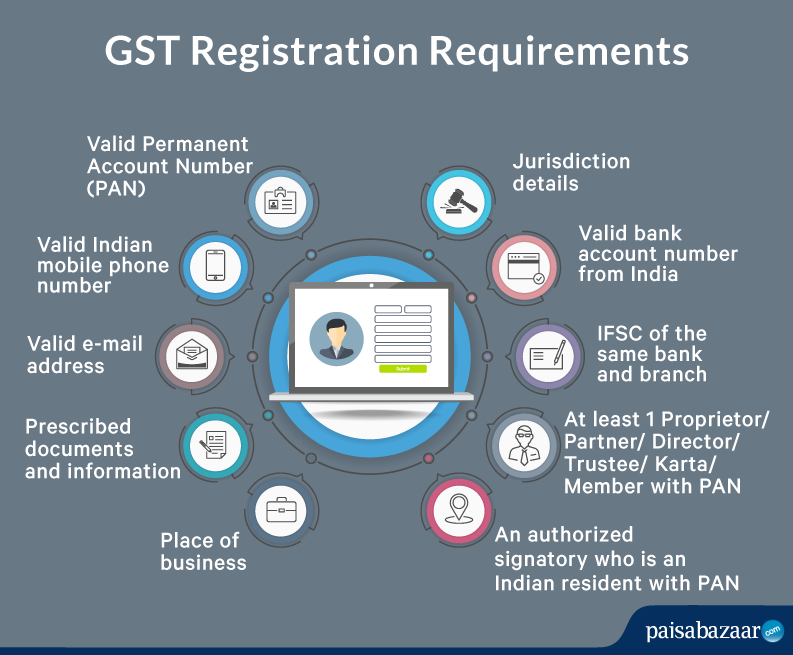Navigating the Complexities of GST Registration: Specialist Tips and Best Practices for Easier Compliance
From deciphering registration requirements to utilizing technological tools for streamlined processes, the trip in the direction of smoother GST conformity is nuanced and complex. Keep tuned to discover crucial strategies and understandings that can aid organizations guide via the intricacies of GST enrollment with finesse and confidence.
Understanding GST Registration Needs

In enhancement to turn over thresholds, companies participating in interstate sales or offering taxable services may also be required to sign up for GST, even if their turn over is listed below the recommended limit (Singapore GST Registration). Understanding these needs and thresholds is essential to stay clear of charges and guarantee smooth procedures within the lawful framework
In addition, services should gather and prepare the essential paperwork, such as proof of identity, address, organization unification, and savings account information, before initiating the GST registration procedure. Falling short to provide precise information or fulfill the registration target dates can result in fines or other legal consequences. Consequently, organizations should stay informed regarding the specific GST registration requirements appropriate to their operations to maintain conformity and avoid prospective issues.
Organizing Essential Documents
Businesses starting the GST enrollment process have to diligently compile and organize the vital documents required for entry. The vital papers usually required for GST registration consist of proof of business registration or identity, incorporation and address evidence of the business owners or partners, checking account information, evidence of principal workplace, and consent forms. Making sure that these papers are easily offered and organized can simplify the registration procedure and stop hold-ups or denials.
To successfully arrange important paperwork, businesses should produce a centralized system for storing and classifying the called for documentation (Singapore GST Registration). Using digital storage services can assist preserve very easy gain access to and make certain that papers are safely kept. Additionally, establishing a checklist of all needed documents can function as a practical tool to track what has been collected and what is still needed for submission

Leveraging Technology for Effectiveness
Enhancing functional efficiency via technical assimilation is paramount for contemporary services navigating the complexities of GST enrollment. One of the key means modern technology can help in GST enrollment is with the use of automated software remedies.
Additionally, innovation can promote seamless interaction with tax obligation authorities. Online websites and interaction tools allow companies to send records, fix questions, and receive updates her latest blog in a much more reliable manner. This not only quickens the registration process however additionally helps in preserving trustworthy and clear communication with the appropriate authorities.
In addition, cloud-based storage options provide a protected system for businesses to store and access their monetary information, making certain conformity with GST record-keeping needs. By centralizing data storage and automating processes, companies can boost their total performance and precision in GST registration procedures.
Proactive Conformity Surveillance

To make sure effective proactive compliance surveillance, organizations need to develop robust internal controls, conduct periodic audits, and leverage automation devices for real-time monitoring of GST purchases. Regular training sessions for employees on GST conformity requirements can also aid in creating a culture of conformity within the organization. Furthermore, engaging with tax obligation consultants or professionals can provide beneficial insights and support on navigating complicated GST regulations.
Involving With Expert Professionals
Engaging seasoned tax obligation experts can dramatically boost a business's understanding and compliance with detailed GST guidelines. Professional specialists bring a riches of expertise and experience to the table, helping services browse the complexities of GST enrollment easily. By leveraging their competence, companies can guarantee exact filings, minimize the risk of errors, and remain up-to-date with the most recent regulatory changes.
When engaging with specialist professionals, it is vital to pick professionals with a strong record in GST conformity (Singapore GST Registration). Try to find consultants who have a deep understanding of check this the appropriate regulations and regulations, as well as experience dealing with companies in your market. Efficient interaction is type in this collaboration, so make certain to plainly specify your assumptions and develop normal touchpoints to review progress and address any concerns
Furthermore, expert consultants can provide useful insights and recommendations on enhancing your tax obligation technique, determining potential cost-saving opportunities, and improving your compliance processes. Generally, investing in expert consultancy solutions can go a lengthy means in guaranteeing smoother GST compliance and preventing costly errors.
Final Thought
Finally, browsing the complexities of GST enrollment needs a complete understanding of the needs, company of essential documents, leveraging modern technology for performance, aggressive conformity tracking, and interaction with expert specialists. By complying with these best practices, organizations can guarantee smoother compliance with GST laws and stay clear of possible penalties or penalties. It is necessary to remain educated, aggressive, and persistent in managing GST enrollment to keep compliance and support monetary stability.
To ensure compliance with tax regulations, services must extensively understand the complex requirements for GST enrollment. Goods and Solutions Tax Obligation (GST) is a value-added tax imposed on most products and solutions in a country, making it crucial for services to register for GST to prevent legal consequences.Additionally, services have to gather and prepare the needed documentation, such as proof of identity, address, organization incorporation, and bank account information, prior to initiating the GST registration procedure. Organizations ought to remain educated concerning the specific GST registration needs applicable to their procedures to keep conformity and avoid potential problems.
The crucial records generally needed for GST enrollment consist of evidence of organization enrollment or identification, address and unification evidence of the business proprietors or companions, financial institution account information, evidence of primary location of company, and permission types.